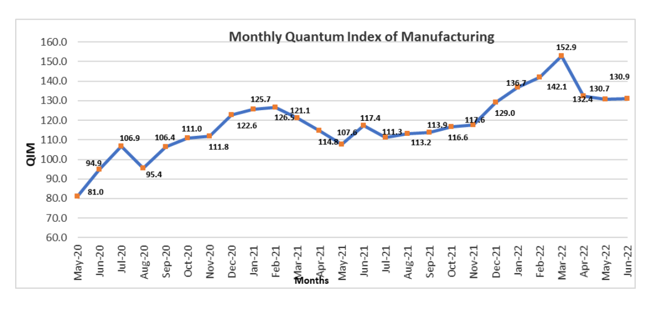INP-WealthPk
By Irfan Ahmed
ISLAMABAD, Aug 22 (INP-WealthPK): The overall output of the large-scale manufacturing industry (LSMI) in Pakistan increased by 11.7 percent and remained at 127.3 points in the financial year 2021-22 as compared to 113.9 points in the fiscal year 2020-21, WealtkPK reports.
However, the provisional quantum indices of LSMI showed a growth of 7.7 percent and reached 160.2 points in the fiscal year 2021-22 as compared to the fiscal year 2020-21, according to the Pakistan Bureau of Statistics (PBS).
The provisional quantum index numbers (QIM) of LSMI have been computed based on the latest production data of 112 items. On a year-on-year basis, the industry grew by 11.5 percent and remained at 130.9 points in June 2022 as compared to 117.4 points in June 2021.
On a monthly basis, LSMI output recorded an increase of 0.2 percent and remained at 130.9 points in June 2022 as compared to 130.7 points in May 2022.

Source: Pakistan Bureau of Statistics
The provisional QIM is being computed based on the latest production data received from sources, including the Oil Companies Advisory Committee (OCAC), Ministry of Industries and Production (MIP) and provincial bureaus of statistics (BOS).
The production of food items, textile, wearing apparel, chemicals, pharmaceuticals, iron and steel products, automobiles and furniture has increased in July-June 2021-22 as compared to July-June 2020-21while the production of rubber products and transport equipment has shown a decrease.

The main contributors to the overall growth of LSMI include garments with 3.8 percent, liquids/syrups 1.9 percent, sugar 1.7 percent, jeeps and cars 1.3 percent, furniture 1.1 percent, blankets 0.6 percent, chemical products 0.6 percent, billets/ingots 0.5 percent and cigarettes with 0.4 percent.
On the contrary, the commodities that witnessed a decrease in production during July-June 2021-22 included wearing apparel with a 23.3 percent decrease, leather products 25.6 percent, wood products 39.4 percent, computer, electronics and optical products 25.7 percent and electrical equipment with a 2.3 percent decrease while other manufacturing mainly football showed a 17.1 percent decrease.
The petroleum products witnessed an increase of 0.7 percent as its output went up from 14.329 billion litres during the financial year 2020-21 to 14.388 billion litres in 2021-22. On a year-on-year basis, the petroleum sector witnessed a negative growth of 9.2 percent as its output decreased from 1.361 billion litres in June 2021 to 1.255 billion litres in June 2022.
The production of cement witnessed a 3.6 percent decrease during July-June 2021-22 and remained 48.011 million tonnes as compared to 49.797 million tonnes during the same period of last year. However, the sector registered 4.4 percent growth in June 2022 and remained 4.871 million tonnes as compared to 4.666 million tonnes in the financial year 2020-21.
The manufacturing of refrigerators grew by 2.8 percent and reached from 1.350 million units in July-June 2020-21 to 1.389 million units in July-June 2021-22. On a year-on-year basis, the production of refrigerators witnessed a 22.3 percent decrease in June 2022 and remained at 123,891 units as compared to 159,539 units in June 2021.
On the other hand, the manufacturing of sewing machines witnessed a 27.2 percent decline in July-June 2021-22 and the quantity remained at 14,711 units as compared to 20,211 units in the financial year 2020-21.
In addition, the production of jeeps and cars witnessed a 50.5 increase and reached 232,015 units in the financial year 2021-22 from 154,123 units in the fiscal year 2020-21. The production of sugar production increased by 39.1 percent during July-June 2021-22 and reached 7.921 million metric tonnes from 5.694 million metric tonnes in the financial year 2020-21.
The performance of LSMI was encouraging in June and it appears that it will continue to function well shortly, according to the research conducted by WealthPK.
The growth of the manufacturing industry is a key indicator of economic prosperity. By creating jobs, industries contribute to the eradication of poverty and unemployment.
Credit: Independent News Pakistan-WealthPk




